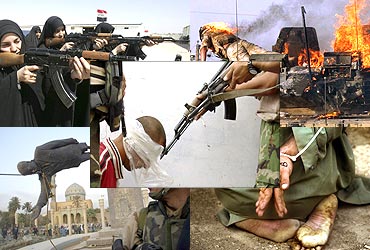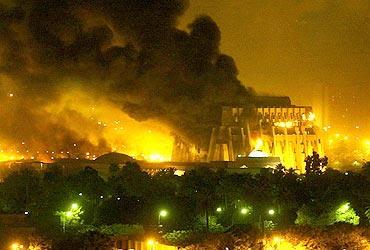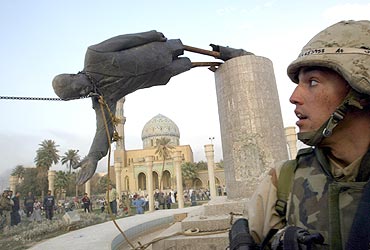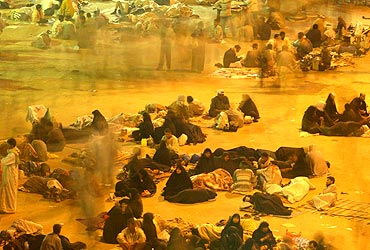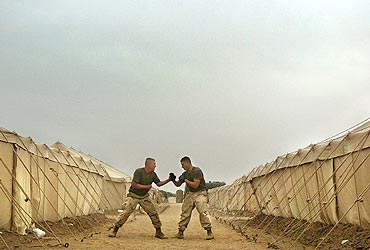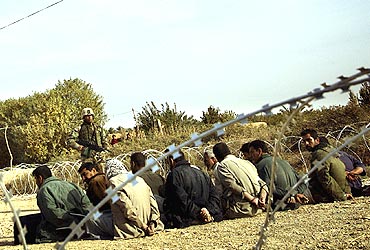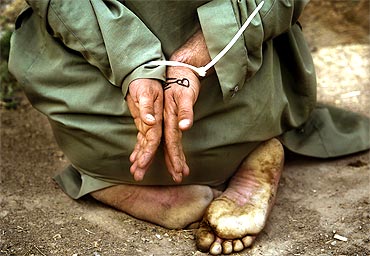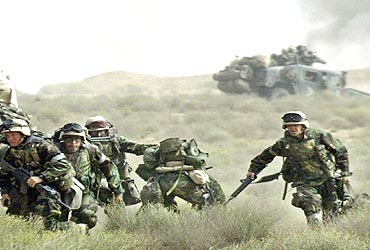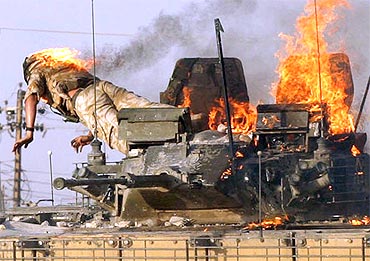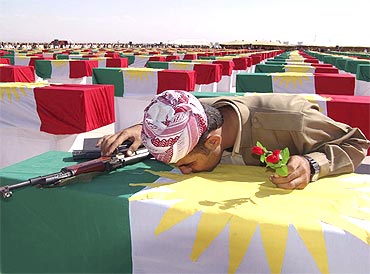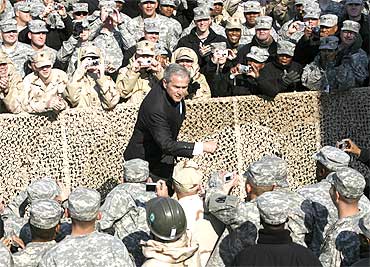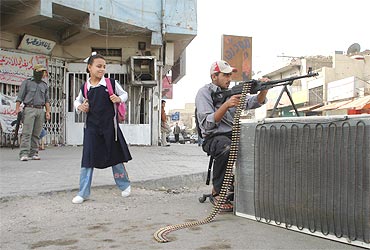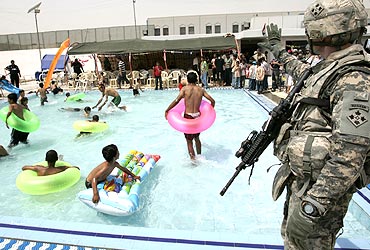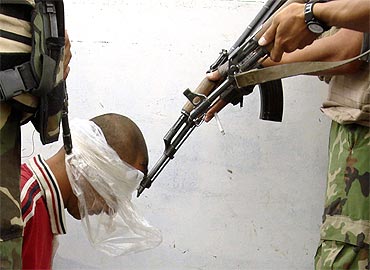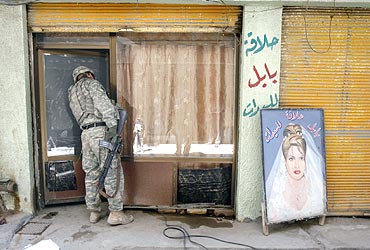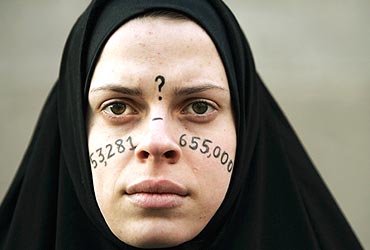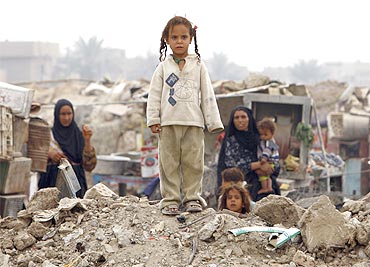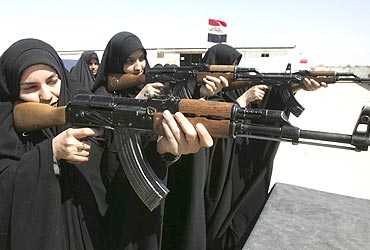 | « Back to article | Print this article |
The Most Striking Images of the Iraq War
United States President Barack Obama has formally declared that the combat mission in Iraq is over.
The seven-year-old war has cost both countries heavily. America lost 4,400 troopers and hundreds of billions of dollars. Countless number of civilian lives has been lost in Iraq, which faces an uncertain future as US withdraws its troops.
Rediff.com takes a look at the most haunting images of the war that changed the destiny of two nations.
Click on NEXT to see the captivating photo feature...
The Most Striking Images of the Iraq War
An explosion rocks Baghdad during air strikes on March 21, 2003. US-led forces unleashed a devastating blitz on Baghdad on March 21, triggering giant fireballs and deafening explosions and sending huge mushroom clouds above the city centre.
Missiles slammed into the main palace complex of President Saddam Hussein on the bank of the Tigris River, and key government buildings, in an onslaught that far exceeded strikes that launched the war on March 20.
The Most Striking Images of the Iraq War
US Marine Corp trooper Kirk Dalrymple watches as a statue of Iraq's President Saddam Hussein falls in central Baghdad on April 9, 2003.
US troops pulled down a 20-foot high statue of President Saddam Hussein in central Baghdad on Wednesday and Iraqis danced on it in contempt for the man who ruled them with an iron grip for 24 years.
In scenes reminiscent of the fall of the Berlin Wall in 1989, Iraqis took a sledgehammer to the marble plinth under the statue of Saddam. Youths had placed a noose around the statue's neck and attached the rope to a US armoured recovery vehicle.
The Most Striking Images of the Iraq War
Iraqi Shia pilgrims camp around a holy mosque in the centre of Kerbala on April 21, 2003.
Hundreds of thousands of Shia pilgrims are expected to make the Arabian pilgrimage, one of the holiest events on the Shia calender, to Kerbala on April 23 for the first time in 26 years after coalition forces ousted Iraqi President Saddam Hussein.
Saddam Hussein had banned the pilgrimage.
The Most Striking Images of the Iraq War
The Most Striking Images of the Iraq War
Soldiers of the US Army's 4th Infantry Division guard detained Iraqis during an early morning raid in the village of Maidan on November 7, 2003.
As deadly guerrilla attacks against US forces have been increasing in parts of Iraq, troops detained dozens of Iraqis after raiding the village, looking for members of a suspected cell planning attacks on coalition forces.
The Most Striking Images of the Iraq War
A chaplain baptises US marine Albert Martinez from Sunnyvalle, California after a protestant Sunday service in a base in northern Kuwait, close to the Iraqi border on March 16, 2003.
A chaplain baptised infantrymen in the early morning sunlight, pushing their heads under the water of a field pool built from sandbags and plastic sheeting. Fellow soldiers cheered as the newly blessed raised their soaking heads.
United States military preachers plunged converts in uniform into a makeshift baptismal font in the desert on Sunday, as the omens of war turned men's thoughts to God.
The Most Striking Images of the Iraq War
A barefoot Iraqi man is detained by soldiers of the US Army's 4th Infantry Division during a raid in the suburb of Baquba in Baghdad on November 9, 2003.
US troops raided several houses in Baquba late afternoon, looking for members of suspected terrorist cells planning attacks on coalition forces.
The Most Striking Images of the Iraq War
The Most Striking Images of the Iraq War
A British soldier jumps from a burning tank which was set ablaze after a shooting incident in the southern Iraqi city of Basra on September 19, 2005.
Angry crowds attacked a British tank with petrol bombs and rocks in Basra on Monday after Iraqi authorities said they had detained two British undercover soldiers in the southern city for firing on the police.
Two Iraqis were killed in the violence, an interior ministry official said.
The Most Striking Images of the Iraq War
A Kurdish Peshmerga soldier kisses the coffin of a person killed during former Iraqi President Saddam Hussein's rule at a ceremony in Arbil's airport, northern Iraq, on October 17, 2005.
The bodies of some 7,500 members of the Kurdish Barzani tribe, who were made captive and then executed, were buried in mass graves at the border between Iraq and Saudi Arabia. These bodies were brought to Arbil for reburial.
Saddam Hussein went on trial for crimes against humanity on October 19, 2005. He was found guilty and executed in December, 2006.
The Most Striking Images of the Iraq War
US President George W Bush greets US soldiers based at Camp Arifjan in Kuwait on January 12, 2007.
Bush held talks with top US officials in Iraq at the base in Kuwait, during a Gulf tour he hopes will aid the Israeli-Palestinian peace process and contain Iran.
The Most Striking Images of the Iraq War
A girl looks at a local resident manning a machinegun at a checkpoint in Baghdad's Adhamiya Sunni neighbourhood on November 12, 2007.
US-Iraqi military forces allowed nearly 300 local residents of Adhamiya district use their weapons to conduct patrols and checkpoints, so that they can provide security in their area and help soldiers fight the Al Qaeda insurgents.
The Most Striking Images of the Iraq War
The Most Striking Images of the Iraq War
The Most Striking Images of the Iraq War
The Most Striking Images of the Iraq War
The Most Striking Images of the Iraq War
Residents wait for the distribution of relief goods by the Red Crescent organisation to a poor neighbourhood in Baghdad's Abu Dsheer district on September 8, 2008.
Resettling displaced Iraqis promises to be a major challenge towards achieving reconciliation and averting renewed violence.
The Most Striking Images of the Iraq War
Iraqi policewomen aim their weapons during training at a police academy in Kerbala, 80 km southwest of Baghdad, on March 22, 2009.
Nearly 2,000 policewomen have participated in the three-month training course.
